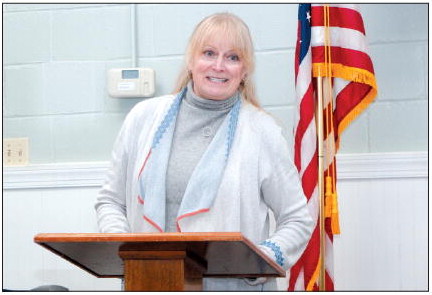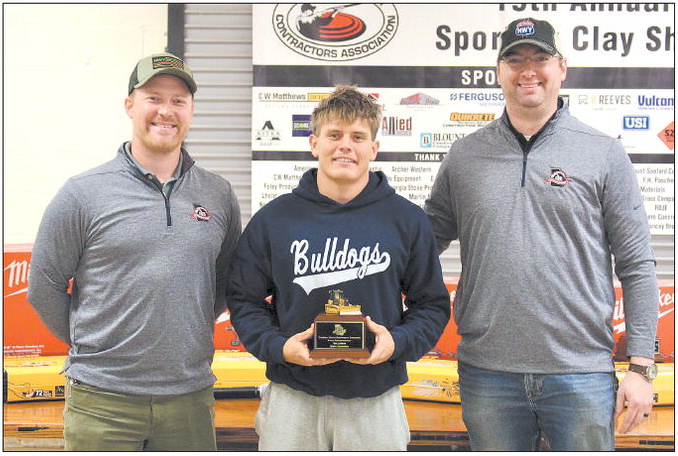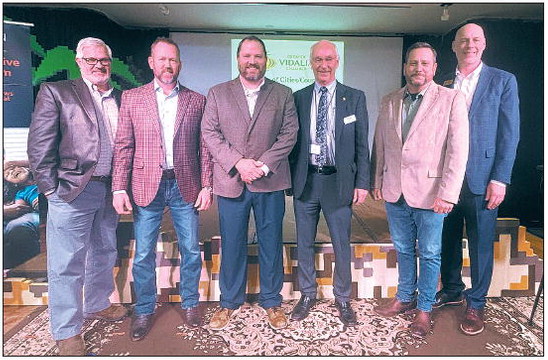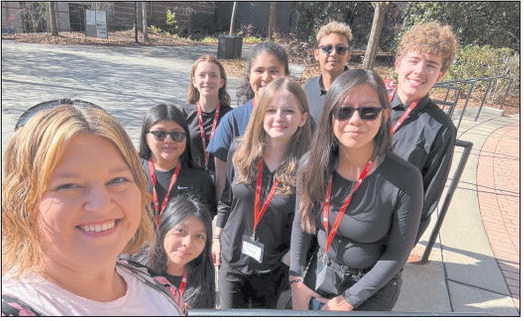Choosing Freedom: A Hungarian Family’s Escape From Communism


mrandolphadvance@gmail.com
First-generation American Dr. Kinga Ferrara spoke to the Vidalia Chapter of the Daughters of the American Revolution (DAR) at their recent meeting on Wednesday, November 1, about life be- continued from page
hind the Iron Curtain and her family’s decision to flee their homeland.
Ferrara, who currently practices medicine at the Department of Veterans Affairs medical center in Dublin, was the first member of her family to be born in the United States but has remained knowledgeable about her family history and native culture. “Growing up, [my name] was kind of torture because I got teased a lot – [other kids called me] Kinga, Conga, Kingaroo, King of the Jungle, you name it. But now that I am an adult, I love my name and I’m proud of it because I’m named after a Hungarian princess who lived in the Middle Ages, married a Polish prince, and united the two empires,” Ferrara began. “She was so instrumental to the development of the culture of that time and was very active within the Roman Catholic Church – she was even sainted after her death; so, I have a patron saint Kinga.”
She continued to discuss her family’s history, as she described life in Hungary prior to World War II. “Back before World War I, Austria and Hungary were allies – they were united under an emperor, and it was the Austro-Hungarian empire. Hungary sits right next to Austria; it is in Eastern Europe. We also share a border with Ukraine, Sylvania, and Romania,” Ferrera began. “World War I came along, and the Austro- Hungarian Empire was allied with the Germans. Needless to say, they did not do very well. At the end of the war, what generally happens when you’ve lost is the winners come in and divide up the spoils. So, what ended up happening was around 40% of the Hungarian land mass ended up being divided over to other countries. So, we lost territory to Romania and Yugoslavia. That sets the backdrop to the type of Hungary that my family was living in.”
According to Ferrara, many citizens were still struggling to recover from the negative effects of World War I when her parents were born in the 1920’s, but the struggle grew tremendously in the 1930’s as Adolf Hitler came to power in Germany.
“Everyone thought that he was this weird, crazy little man, but he really brought Germany out of its depression,” she clarified. “He was able to build up their economy and their military. So, when World War II began, Hungary was promised by Hitler [that they would be returned their territory lost to Romania and Yugoslavia after World War I]. And so, Austria and Hungary ended up allying with Germany – they have paid a high price for that since then, but in the beginning, there was no way of knowing the outcome or what kind of person Hitler was at that time.”
During World War II, Ferrara’s mother’s family lived in a small village that was around the same size of Vidalia. The village was located in a part of the country that focused on agriculture. “It was very similar in a lot of ways to Vidalia,” she remarked. “Back then, it was a very small village, but it has grown since then. My grandfather was a civil engineer and one of the city planners, and he served as the Secretary of Agriculture for that portion of the country. My grandmother was, of course, a homemaker who focused on needlework and managing the home. They had 4 daughters – my mom was the second oldest – and they were a close knit family.” She continued, “As World War II progressed and things started going very badly for the Germans and their families, it became very obvious that things were going to change drastically whenever Hitler finally gave up and surrendered. So, there was always a fear that the political situation in Hungary was going to deteriorate very badly. The Nazis had gone into Russia and had a horrible, drawn-out battle that went on for months. The Germans ended up losing and having to retreat, but in the process, several million Russians were killed – both civilians and military personnel. So, when the Germans retreated and it became obvious that they would be losing the war, the Russians began retribution to take as much a pound of flesh from their enemy as possible.”
To complete this retribution, the Russians marched to the Hungarian border from Russia. “I read my uncle’s memoirs not too long ago, and he was saying how he was in the Hungarian mounted calvary; he travelled throughout Europe with his calvary battalion, and has some great stories to tell in his memoirs. He remembered thinking, ‘There’s no way the West is going to allow the Russians to just take over this big part of Europe – that’s just never going to happen,’” Ferrara recalled.
She explained that the Hungarian soldiers had two priorities as the Calvary neared the Hungarian border – to protect their country and to return to their homes to protect their families. “They tried desperately, but events caught up with them, and the Russians got closer and closer,” Ferrara said. “My grandfather was faced with a very difficult decision: should he stay and risk what the Russians were doing once they conquered? They raped the women; they killed indiscriminately — they didn’t care who. They took whatever they wanted, and if they didn’t want it, they destroyed it. So, he was faced with that; the alternative was to leave his homeland and maybe never come back.”
“So, with a wife and 4 daughters, there was really no choice – he was not going to allow them to be taken and raped by the Russians,” she emphasized. “He told the family, ‘Prepare, we’re leaving. You can only bring what you can carry.’ I can’t even imagine what that was like for them to just leave everything they knew their whole lives, but they did. As they were trying to escape – initially, it was on foot with 4 girls, an older lady, and my grandfather who was around 50 at the time – the Russians were moving faster than they were. [During this time,] my grandfather apparently had been prepared to shoot his daughters and his wife to prevent them from having to endure the abuse of the Russian soldiers [if captured].”
The family spent several months traveling to Bavaria, where abandoned army barracks had been transformed into a refugee camp by American troops and other allies; these transformed barracks housed numerous displaced families and individuals in a safe environment. It was in this refugee camp where Ferrara’s mother met her father, who had also been fleeing Russian conquest.
Ferrara’s father’s family came from a different part of Hungary than her mother’s family. “He had been a part of the Hungarian Air Force,” she remarked. “He was just a young man towards the end of the war, and went to the Air Force Academy. He was a cadet there and was learning to fly fighter jets. When the war was lost, his family escaped to Bavaria as well.”
The couple lived in the camp for 7 years, as they married in a nearby chapel and even delivered the family’s first child within the camp’s walls.
“There was practically no food – very little food [in the refugee camps]. My parents couldn’t stand peanut butter, because apparently, the Americans gave them peanut butter to live off of,” she commented. “There also was no medical care. In 1950, my mother was 3 weeks overdue with my sister, and [the camp] had no means to induce labor – it was very, very rough on my mother.”
Yet, though the refugee camp had many difficulties, the environment bonded the inhabitants into lifelong friendships. “Lifelong bonds were created between all of those people who went through all of those trials together,” she stressed. “My parents maintained those relationships as best they could over the years.”
When the refugees began deciding which country to restart their lives in, many chose other nations, such as Canada or Australia, rather than the United States; yet, Ferrara’s family was determined to live in the USA. “First of all, they saw what kind of character the American soldiers had – how they looked after the civilians; they were good people,” she recalled. “As they got to know the soldiers and learn more about what life in America was all about, they realized the America is the only place with a Constitution and Bill of Rights that protects our individual rights as citizens – they don’t have that in Canada or Australia or any of those other places. This is where they wanted to be.”
The family came to the United States by ship, and ultimately, settled in Detroit, as many refugees coming to America did because of the amount of industry within the city, which provided jobs. They were assigned a sponsor family, who agreed to look after the family and be responsible for any unpaid debt they may have. Soon, an influx of Hungarian refugees began to flee to the city, which created a Hungarian neighborhood, full of Hungarian people, food, shops, and culture.
“My dad worked as a type setter at a Hungarian newspaper [in the neighborhood] until he could learn English,” she informed the attendees. “My mom worked at a Hungarian bakery. They both worked to support us, and when my father felt like his English was good enough [to succeed in college], he went and got a graduate degree – a Master’s Degree in library sciences.”
After obtaining the degree, Ferrara’s father moved the family to Colorado, where he worked as a librarian at the University of Northern Colorado, which at the time was a teachers’ college known as Colorado State College. “That’s really where most of my memories are – I was 7 when we moved there,” she emphasized.
Ferrara said that both the pride and gratitude which her father felt for the family’s new life in America was almost inexplicable. “It’s impossible to express how grateful people like my family and I are to the United States for everything that they gave us and allowed us to be because once you learned the language, it was like, ‘You’re on your own; make of your life what it will be,’” she stressed. “Those Hungarians, they didn’t hold back. They just had a tremendous desire to excel and to give back to the communities that had taken them in. Of course, my dad had the typical immigrant mentality with his children – ‘You will study; you will succeed – you’re not going to waste this opportunity!’ So, I ended up in medical school and I know he was very proud and would be proud to see me and my family today and everything we’ve accomplished.”
She also clarified that not all members of her extended family left their home country – her uncle, who served in the Mounted Calvary, was even forced to abandon his horse – which had endured numerous battles with him – and enter an American prisoner of war camp, as the troops worked to determine how to handle the situation.
Ferrara’s aunts also stayed in Hungary and lived in Budapest. She went back to visit the family when she was 17. During this visit, she began to grasp the dark reality of communism and the Iron Curtain. “Boy, was that an eye opener for a kid living in the United States. To cross the border to get into Hungary, there are armed guards on top of these towers on the sides of the road, standing there with their rifles. There’s barred wire in a checkerboard fashion along the border, and in between, there are land mines,” she recalled. “When I realized they were there to keep people in rather than keeping us out, it was astonishing.”
“When we went to Budapest, the first day, one of my aunts took us aside and said, ‘You really have to be careful what you say around the landlord because he’s a communist. If you say anything against the government, you will be imprisoned.’ Of course, they couldn’t imprison us, but they would have imprisoned [my aunts],” she added. “That was so insane. As a kid, we could say anything – we could do whatever we wanted to as long as we weren’t going to get in trouble for it or break the law – and there, it was such a sense of ‘somebody’s watching; somebody’s listening.’ You didn’t have the freedoms.”
Since then, Hungary has gotten rid of their communist leadership and is now governed by a president. The country continues to value its language and culture, and does not allow migration of many populations to the area, with the exception of Ukrainian refugees who currently live in the country with the understanding that they will leave once peace is found in Ukraine.
Ferrara now lives in Vidalia with her Italian husband, George, who works as an anesthesiologist in Dublin at the same medical center as his wife. The couple have one daughter, Olivia, who graduated from Robert Toombs Christian Academy.






